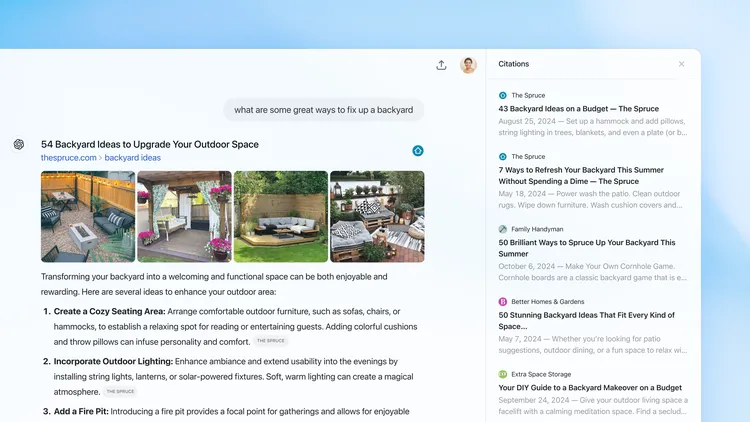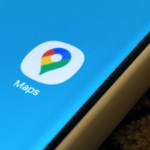It launches today for paid subscribers and will expand to free, enterprise, and education users in the coming weeks.
ChatGPT has officially transformed into a comprehensive, AI-powered search tool. Starting today, paid subscribers and SearchGPT waitlist members can access real-time information through ChatGPT, with plans to roll it out to free, enterprise, and educational accounts in the coming weeks. Rather than releasing this search functionality as a standalone product, OpenAI is integrating it directly into ChatGPT’s familiar interface, marking a significant upgrade in the AI experience for users worldwide.
With the addition of real-time search, ChatGPT now closes a crucial gap in AI capabilities, leveling up to compete with major tech rivals like Microsoft Copilot and Google Gemini, both of which already offer real-time internet access. Users can choose to let ChatGPT decide when to use web searches based on the context of the conversation or trigger searches manually for more direct control. This shift solidifies ChatGPT as not just an AI assistant but as a full-fledged web search tool in its own right, with broader and smarter functionality than ever before.
Unveiling the New Search Capabilities: A User-Centric Approach to Real-Time Information
During a pre-launch demo, Adam Fry, who leads ChatGPT’s search initiative, demonstrated the new feature by searching for real-time data, such as Apple’s stock prices and the latest news. ChatGPT displayed an interactive stock graph, a summary of upcoming earnings reports, and news articles complete with clickable citations linking directly to original sources. Users can also view a curated list of websites in a “sources sidebar,” which offers easy browsing of relevant content.
In another scenario, Fry used ChatGPT to search for Italian restaurants in San Francisco. ChatGPT returned an interactive map with restaurant pins, allowing him to refine his search by requesting “more casual, neighborhood-style” spots. This ability to filter and refine search results within the conversation empowers users to dig deeper into specific information without switching platforms.
The integration also spans multiple devices, enabling access across all ChatGPT-supported platforms, including iOS, Android, macOS, and Windows. According to OpenAI, ChatGPT’s search functionality relies on “a blend of search technologies” that include Microsoft’s Bing, built on a fine-tuned version of OpenAI’s GPT-4o model.
Originally, this feature was released in prototype form as “SearchGPT” to 10,000 test users in July. The rollout signifies OpenAI’s ambition to establish ChatGPT as a powerhouse in AI-driven search, even luring talent from competitors like Google to build a robust search team.

AI Search Heating Up as Competitors Rush to Catch Up
This launch couldn’t come at a more competitive time for AI-powered search, with many tech giants racing to develop and refine their own versions. Meta is reportedly in the process of building an AI search solution, and Google recently expanded its AI-powered search features to users in over 100 countries. Alphabet’s earnings this week, reporting a substantial $49.4 billion in Q3 search revenue, underscore the high stakes of this race for AI supremacy. However, Fry clarified that the timing of ChatGPT’s release was independently scheduled, despite coinciding with Alphabet’s financial updates.
One distinctive edge for ChatGPT’s search engine? A refreshing lack of ads. While traditional search engines, particularly Google, make substantial profits from advertising pinned at the top of search results, OpenAI says there are “no plans” to introduce ads in ChatGPT. For users weary of sponsored results and clutter, this ad-free environment could be a key reason to prefer ChatGPT’s new search capabilities. Still, there are some considerations around financing: maintaining an AI-powered search engine is costly, and while there are no charges for free users, OpenAI has indicated it may introduce limits on how often they can access the latest search models.
Navigating Legal and Ethical Complexities in AI Search
The growing prevalence of AI-powered search engines has also led to rising legal concerns. Recently, both News Corp and The New York Times filed lawsuits against Perplexity, an AI search startup, accusing it of “massive freeriding” and copyright violations. OpenAI faces similar challenges: The New York Times has sued OpenAI over alleged use of its material to train large language models, leading to questions about how AI companies source and handle copyrighted content.
Addressing these issues, Fry shared that OpenAI is working closely with a wide network of publishers to foster responsible and mutually beneficial content-sharing practices. Publishers are allowed to opt out of OpenAI’s web crawler if they choose, and the crawler does not bypass paywalls, respecting the publishers’ proprietary content. In the last year, OpenAI has established numerous partnerships with major media companies such as Hearst, Condé Nast, Axel Springer, and News Corp. While Fry notes that partners gain more “control” over how their content appears in ChatGPT, they are not granted higher visibility by default, reinforcing a commitment to fair access.
Striving for Accuracy: Tackling AI “Hallucinations” with Real-Time Data
Accuracy remains a priority as ChatGPT debuts in the search space, especially with notorious cases of AI “hallucinations”—moments when AI models provide incorrect or misleading information. Google’s AI system, for instance, once humorously advised users to put glue on pizza. OpenAI hopes that ChatGPT’s access to real-time information will reduce these inaccuracies by grounding its responses in current data.
“Some hallucinations stem from the lack of access to the latest information,” Fry explained. With real-time search, ChatGPT is better equipped to determine what constitutes a true, factual answer. Fry acknowledges that no system is perfect, and occasional errors are unavoidable, but OpenAI aims to be transparent if and when mistakes occur.
ChatGPT’s live search is debuting just days before the US presidential election, a moment when reliable information is especially critical. Fry emphasized that OpenAI is taking extra measures to ensure accurate election-related results and to “elevate authoritative sources” for users seeking credible election information.
A New Era of Search with ChatGPT: Intelligent, Ad-Free, and Accessible
The integration of web search into ChatGPT represents a major evolution in AI’s role in everyday digital tasks, from information gathering to on-the-spot decision-making. It combines the conversational prowess of a chatbot with the knowledge and adaptability of a search engine, delivering a more versatile and interactive user experience. This launch signals a new era in AI-driven search, one that places high value on user needs, privacy, and accuracy.
With real-time search now accessible to ChatGPT users across devices and operating systems, OpenAI is setting a high standard in the competitive world of AI-powered search. As ChatGPT continues to evolve, it stands poised to redefine how we interact with information online, making digital discovery more intuitive, insightful, and relevant for the modern user.










